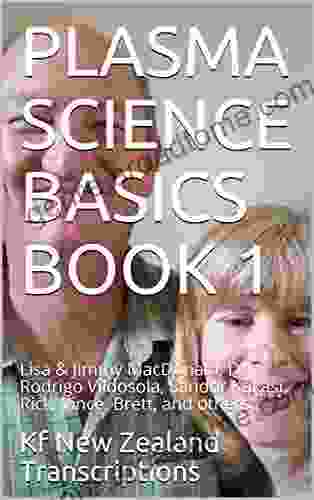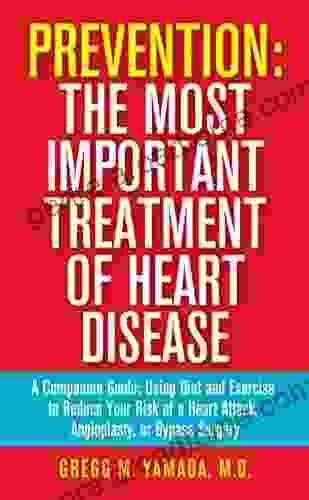The Most Important Treatment Of Heart Disease

4.8 out of 5
| Language | : | English |
| File size | : | 1338 KB |
| Text-to-Speech | : | Enabled |
| Screen Reader | : | Supported |
| Enhanced typesetting | : | Enabled |
| Word Wise | : | Enabled |
| Print length | : | 59 pages |
| Lending | : | Enabled |
Heart disease is the leading cause of death in the United States. It is a complex condition that can affect the heart and blood vessels in many ways. The most common type of heart disease is coronary artery disease, which occurs when the arteries that supply blood to the heart become narrowed or blocked. This can lead to a heart attack, which can be fatal.
There are many different treatments for heart disease, depending on the type of heart disease and the severity of the condition. Lifestyle changes are often the first line of treatment for heart disease. These changes can include eating a healthy diet, getting regular exercise, and quitting smoking. Medications may also be prescribed to help control blood pressure, cholesterol, and other risk factors for heart disease. Surgery may be necessary to treat more severe cases of heart disease, such as coronary artery bypass surgery or heart valve replacement.
The most important treatment for heart disease is prevention. By making healthy lifestyle choices and managing risk factors, you can help reduce your risk of developing heart disease. If you have been diagnosed with heart disease, there are many treatments available to help you manage your condition and improve your quality of life.
Lifestyle Changes
Lifestyle changes are often the first line of treatment for heart disease. These changes can include:
- Eating a healthy diet
- Getting regular exercise
- Quitting smoking
- Managing stress
- Getting enough sleep
Eating a healthy diet is one of the most important things you can do to prevent and treat heart disease. A healthy diet for heart health includes plenty of fruits, vegetables, and whole grains. It also includes lean protein and low-fat dairy products. Limit saturated and trans fats, cholesterol, and sodium.
Getting regular exercise is another important part of a healthy lifestyle for heart health. Exercise helps to strengthen the heart and improve blood flow. It can also help to lower blood pressure and cholesterol. Aim for at least 30 minutes of moderate-intensity exercise most days of the week.
Quitting smoking is one of the best things you can do for your heart health. Smoking damages the blood vessels and increases the risk of heart disease, stroke, and other health problems. If you smoke, quit as soon as possible.
Managing stress is also important for heart health. Stress can increase blood pressure and heart rate, and it can lead to unhealthy behaviors, such as overeating and smoking. Find healthy ways to manage stress, such as exercise, yoga, or meditation.
Getting enough sleep is also important for heart health. When you don't get enough sleep, your body produces more of the stress hormone cortisol. Cortisol can increase blood pressure and heart rate, and it can lead to weight gain. Aim for 7-8 hours of sleep per night.
Medications
Medications may also be prescribed to help control blood pressure, cholesterol, and other risk factors for heart disease. These medications include:
- Blood pressure medications
- Cholesterol-lowering medications
- Antiplatelet medications
- anticoagulant medications
- Heart failure medications
Blood pressure medications help to lower blood pressure. High blood pressure is a major risk factor for heart disease, stroke, and kidney disease. Cholesterol-lowering medications help to lower cholesterol levels. High cholesterol is a major risk factor for heart disease and stroke.
Antiplatelet medications help to prevent blood clots. Blood clots can block arteries and lead to a heart attack or stroke. Anticoagulant medications also help to prevent blood clots. They are used to treat people who have a high risk of developing blood clots, such as people with atrial fibrillation.
Heart failure medications help to improve the heart's ability to pump blood. Heart failure is a condition in which the heart is unable to pump enough blood to meet the body's needs. This can lead to shortness of breath, fatigue, and swelling in the legs and ankles.
Surgery
Surgery may be necessary to treat more severe cases of heart disease. These surgeries include:
- Coronary artery bypass surgery
- Heart valve replacement
- Heart transplant
Coronary artery bypass surgery is a surgery to improve blood flow to the heart. This surgery is done by grafting a new blood vessel from another part of the body to the blocked artery. This allows blood to flow around the blockage and to the heart.
Heart valve replacement is a surgery to replace a damaged heart valve. Heart valves help to control the flow of blood through the heart. If a heart valve is damaged, it can lead to heart failure. Heart valve replacement surgery is done to replace the damaged valve with a new valve.
Heart transplant is a surgery to replace a damaged heart with a healthy heart from a donor. Heart transplant surgery is done to treat people who have severe heart failure and who are not responding to other treatments.
Prevention
The most important treatment for heart disease is prevention. By making healthy lifestyle choices and managing risk factors, you can help reduce your risk of developing heart disease. Here are some tips for preventing heart disease:
- Eat a healthy diet
- Get regular exercise
- Quit smoking
- Manage stress
- Get enough sleep
- Know your family history of heart disease
- Get regular checkups
If you have any risk factors for heart disease, talk to your doctor about how you can reduce your risk. By making healthy lifestyle choices and managing risk factors, you can help prevent heart disease and live a long and healthy life.
4.8 out of 5
| Language | : | English |
| File size | : | 1338 KB |
| Text-to-Speech | : | Enabled |
| Screen Reader | : | Supported |
| Enhanced typesetting | : | Enabled |
| Word Wise | : | Enabled |
| Print length | : | 59 pages |
| Lending | : | Enabled |
Do you want to contribute by writing guest posts on this blog?
Please contact us and send us a resume of previous articles that you have written.
 Book
Book Novel
Novel Page
Page Chapter
Chapter Text
Text Story
Story Genre
Genre Reader
Reader Library
Library Paperback
Paperback E-book
E-book Magazine
Magazine Newspaper
Newspaper Paragraph
Paragraph Sentence
Sentence Bookmark
Bookmark Shelf
Shelf Glossary
Glossary Bibliography
Bibliography Foreword
Foreword Preface
Preface Synopsis
Synopsis Annotation
Annotation Footnote
Footnote Manuscript
Manuscript Scroll
Scroll Codex
Codex Tome
Tome Bestseller
Bestseller Classics
Classics Library card
Library card Narrative
Narrative Biography
Biography Autobiography
Autobiography Memoir
Memoir Reference
Reference Encyclopedia
Encyclopedia Kipling A Jackson
Kipling A Jackson Lonnie Boyd
Lonnie Boyd Richard James Clapham
Richard James Clapham Tim Gray
Tim Gray Thomas Hunt
Thomas Hunt Kirsten Jensen
Kirsten Jensen Lee Sartori
Lee Sartori Nigel Ostime
Nigel Ostime Tim Deforest
Tim Deforest Kristine Carlson
Kristine Carlson Krishna Dharma
Krishna Dharma Maya
Maya Prince Acad
Prince Acad Sam George
Sam George Lalit Hundalani
Lalit Hundalani Paul Roberts
Paul Roberts Vic Parsons
Vic Parsons L Thomas Winfree Jr
L Thomas Winfree Jr Lance Casey
Lance Casey Kyungsik Choi
Kyungsik Choi
Light bulbAdvertise smarter! Our strategic ad space ensures maximum exposure. Reserve your spot today!

 Geoffrey BlairDiscover the Foundation of Chinese Language: Master the 214 Chinese Radicals
Geoffrey BlairDiscover the Foundation of Chinese Language: Master the 214 Chinese Radicals
 Jean BlairIntroduce Your Child to the Animal Kingdom with "The Beginner Bible First 100...
Jean BlairIntroduce Your Child to the Animal Kingdom with "The Beginner Bible First 100... Isaac MitchellFollow ·4k
Isaac MitchellFollow ·4k Jamie BlairFollow ·11.1k
Jamie BlairFollow ·11.1k Emmett MitchellFollow ·6.6k
Emmett MitchellFollow ·6.6k Clarence MitchellFollow ·12.7k
Clarence MitchellFollow ·12.7k Eric NelsonFollow ·8.1k
Eric NelsonFollow ·8.1k Jason ReedFollow ·3.8k
Jason ReedFollow ·3.8k Gerald ParkerFollow ·3.1k
Gerald ParkerFollow ·3.1k Alex ReedFollow ·17.9k
Alex ReedFollow ·17.9k

 Charlie Scott
Charlie ScottQuickBooks 2024 In Depth: Your Essential Guide to...
About the Book Are you ready to elevate...

 D'Angelo Carter
D'Angelo CarterUnlocking the Mysteries of Primitive Economies: A Journey...
Prepare to embark on an...

 Milton Bell
Milton BellUnveiling the Secrets of Agile Coaching: A Comprehensive...
In the ever-evolving landscape...

 Tyler Nelson
Tyler NelsonUnveiling the Treasures of Italy: A Journey of Discovery...
Embark on an enchanting expedition into the...
4.8 out of 5
| Language | : | English |
| File size | : | 1338 KB |
| Text-to-Speech | : | Enabled |
| Screen Reader | : | Supported |
| Enhanced typesetting | : | Enabled |
| Word Wise | : | Enabled |
| Print length | : | 59 pages |
| Lending | : | Enabled |











